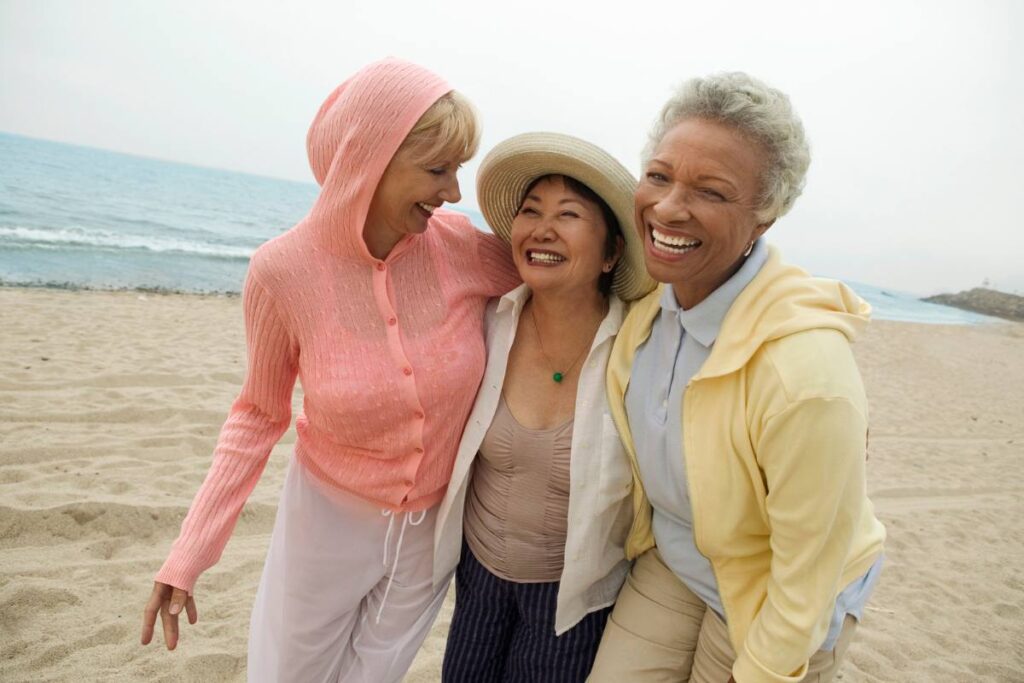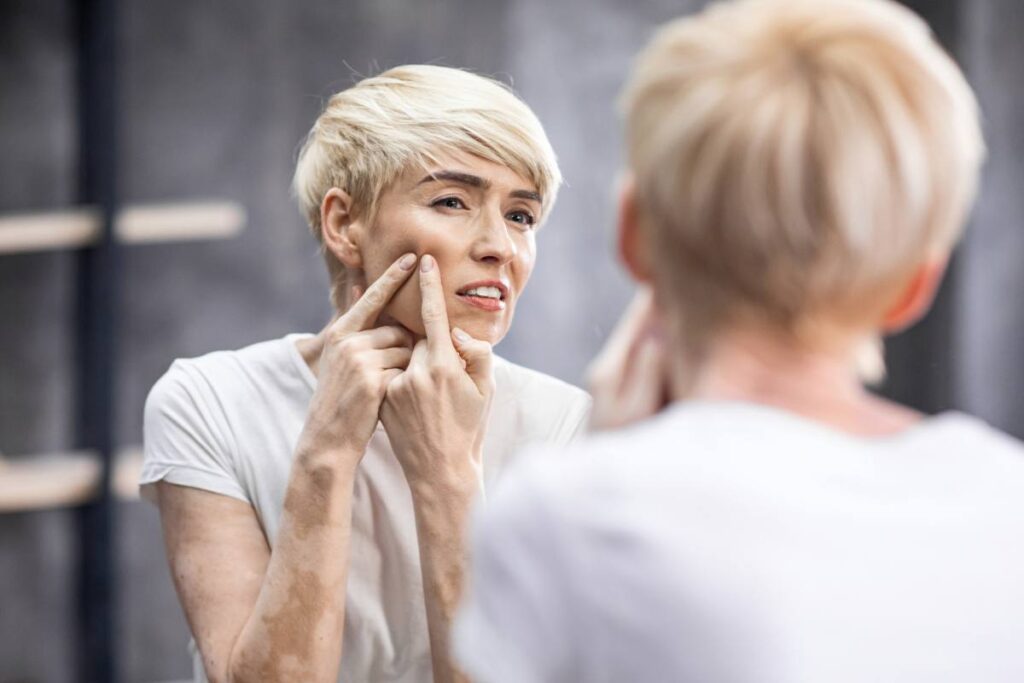Do you remember adolescence – the skin breakouts, emotional volatility, body changes, and more? It might sound strange to take yourself back 30-40 years, but menopause is like a second adolescence. What you experience in midlife is most relatable to the transition from teenager to adult. Menopause, like adolescence, can rock your world. By viewing menopause as a second adolescence, women can better prepare themselves for the midlife change!
What is second puberty?
There are a lot of names for the typical midlife change known as menopause, given its impact and ability to wreak havoc on a woman’s life.
You may have heard of:
- second puberty
- second adolescence
- middlescence
- middlepause
- reverse puberty
Whatever you call it, your outlook can impact how you feel.
While most menopause symptoms are ones you likely haven’t experienced before, you can tap into the knowledge of learned life experiences to better manage them.
As much as menopause is different, it can be very similar at the same time.
During puberty and menopause, you experience:
- Irritability
- Anxiety about what lies ahead.
- Avalanche of body changes.
- A feeling that nobody understands you anymore.
- Unfamiliar territory.
- Trying to fit in.
- Embarrassment.
- Sense of charting a new path forward.
- Self-awareness and exploration.
- Acne or other skin concerns.
Charting that new path forward may be exciting during adolescence, but it’s also scary and overwhelming for some teens.
The same varied experiences happen during menopause too. Every woman’s journey is unique.
Some women experience debilitating menopause symptoms, while others navigate menopause with minimal disruption.
As much as menopause brings about similar changes and emotions, some of the changes have the opposite effect.
| Adolescence | Menopause |
|---|---|
| Sprint | Marathon |
| Eat everything in sight | Watch what you eat |
| Growth spurt | Slowing metabolism |
| Sexual energy | Lack of sexual desire |
| Excitement | Anger, rage |
| Naive | Wisdom |
| Mainstream | Taboo |
While menopause and puberty are unavoidable life occurrences for women, menopause is not as widely discussed. The narrative is changing, but there’s still a long way to go.
Doctors often don’t have the training to recognize symptoms, and unlike your teenage years, you may be a support system of one rather than having a parent to lean on for help and encouragement.
There’s also a lot of judgment around menopause. Society does not view it with as much understanding and knowledge as the teenage years.

Preventing a midlife crisis
While midlife crises are often associated with men, some people call menopause a “midlife crisis” for women because the physical, emotional, and life changes can throw women into a state of turmoil.
The timing of menopause may also coincide with other major life events. You may start thinking about retirement; kids may go off to college, leaving you in a quiet home for the first time in 20 years; your marriage may fail; or you may become a caregiver to your parents or another family member.
The hectic decades of yesteryear become your past. For the first time in a long time, you may have more time on your hands, which enables you to think about how you feel as you go through menopause.
Unlike your teenage years, when many can’t wait to be an adult, there may be less excitement about this next phase of life, which can include a sense of doom or fear of decline attached to it.
In your teenage years, life is just beginning. Your period is just starting, and you’re starting to explore your sexuality and the freedom of adulthood.
Midlife is the end of the reproductive phase of your life. For some women, there’s a certain sadness to this stage, as it’s a biological “end” rather than a biological “beginning.”
If that’s your mindset, it’s normal. However, can also present a problem if the feeling persists too deeply or for a prolonged period of time.
What about thinking about menopause as a liberating time in your life? You no longer have to worry about pregnancy, cramps, or your period.
It’s time for you!
It can be hard to mentally get to this point because menopause has been taboo for so long. And, some symptoms are debilitating and dramatically change your body.
Unlike your teenage years, where you can eat as much as you want and rarely see the side effects, during menopause, you may need to focus on portion control as your metabolism slows.
Despite the changes you’ll have to make in life, there’s still plenty of life to live!
Anxiety with aging is normal. Acknowledge it. But, don’t judge yourself for it.
Instead, focus your time on making small changes that can have a lasting impact.
Menopause mindset shift
While there’s still a great deal of negativity around menopause, particularly in the U.S., there’s also a lot of positive momentum.
Today is a great time to be going through menopause. There’s a dynamic shift happening in the world concerning the natural life cycle of a woman.
It’s becoming less of a taboo subject within mainstream society. High-profile women are posing for magazine covers without makeup.
Gray hair is a cultural phenomenon as women proudly display their grays!
The times are changing. Instead of hiding signs of aging, women are embracing and showcasing it!
In the UK, employers are creating menopause-friendly workplaces. (link to work article)
As much as there’s a spotlight on menopause and increased investment in female health, there’s still a long way to go!
Many women+ may still not be comfortable talking about it, especially with their employer and in the workplace.
Women are often fearful of telling their employer for fear it will hurt their professional career opportunities.
It’s like that time you caked on concealer to cover your acne. It was a short-term fix that made the issue a little less noticeable. But, let’s be honest. You could still see the bumps on your skin.
Over time, you probably realized the concealer worsened the acne by clogging your pores even more!
You realize now that wasn’t a good idea. Teens think concealer is a great idea.
Use the wisdom you have now to the choices you make during the menopause journey. Don’t conceal what’s happening. Embrace it!

Tap into your support system
A simple switch in mindset can change your experience. Society frequently portrays menopause in a negative light.
There’s no disputing the symptoms can be debilitating.
But adolescence wasn’t all that great either, and you survived.
While many teenagers manage the hormonal changes without much interruption to their social and emotional life, some struggle.
They don’t like their “new” body, experience challenges with navigating social circles, and have trouble managing their emotions.
The same is true for menopause – some women will experience life-shattering changes, and others will experience only a few symptoms.
Every woman has a unique journey through menopause.
Just like puberty, your social circles are more important than ever to help you navigate the wave of emotions and physical changes. Your friends are a support system.
Many teenagers are consumed by their friends, but those friendships may wane by midlife.
Rekindle old friendships and find new ones.
Don’t be afraid to talk about your symptoms with others. The more women talk about their feelings and the impact on their lives, the more empowered someone else may feel.
If you need help, know that you are not alone. Seek out a compassionate and understanding counselor who can help you understand your feelings and guide you through your emotions.
Menopause is a time of self-exploration and self-awareness
Just like you explored your body with a new perspective during your teenage years, you’ll likely do the same during menopause.
Instead of growth spurts, your metabolism will likely slow. Adjust your lifestyle accordingly.
Make it a time of self-exploration. The more you know about your body and the more action you take to embrace it, the better off you’ll feel during the menopause transition.
Impactful lifestyle changes
Your symptoms don’t have to control you during menopause. You can control them!
Unlike adolescence, which comes and goes relatively quickly, in just two to five years, the menopause transition can last 7.5 years or longer.
Consider puberty a sprint and menopause a marathon!
Just like you prepare for a marathon, you can also prepare for menopause. However, you may not realize this because society and medical professionals spend more time talking about puberty than menopause.
Has your doctor ever asked you about menopause?
Surprisingly, gynecologists and primary care doctors often don’t have a lot of medical training in menopause.
So, some doctors never ask women in their 40’s about menopause symptoms. The woman has to bring up the conversation. Don’t be surprised if your doctor dismisses or minimizes your symptoms.
Women must be aware of the symptoms and take steps to prepare.
Be an advocate for yourself.
Consider a doctor who specializes in menopause.
Take a hard look at your lifestyle, including sleep habits, exercise, and nutrition.
They can also impact how you feel during menopause.

Reverse puberty
Now you’re ready to reverse the course of menopause! Think about it as another puberty. You survived that, and you’ll survive this!
You’re wiser now and have the advantage of decades of learned experiences.
Arm yourself with as much information as possible so you can control menopause rather than letting it control you!
You can be 50 and sexy. Your experience doesn’t have to be the menopause of the 1950s!
You may also like…

Missing Your Life Before Menopause? How to Manage The Grief and Loss
Do you ever think about life before menopausal symptoms? If you feel a sense of loss or grief, try these emotional coping strategies.

Menopause Hair Loss 101: What Causes It and 7 Ways To Support Hair Growth
Are you experiencing hair loss, changes in texture, or an itchy scalp? Find out why this is happening and how to manage this menopuase symptom.

Menopause Acne?! Why It Happens and How To Treat Your Skin
Do you have pimples on your face or torso in your 40s and 50s? Learn why menopause acne happens and how to treat it.

